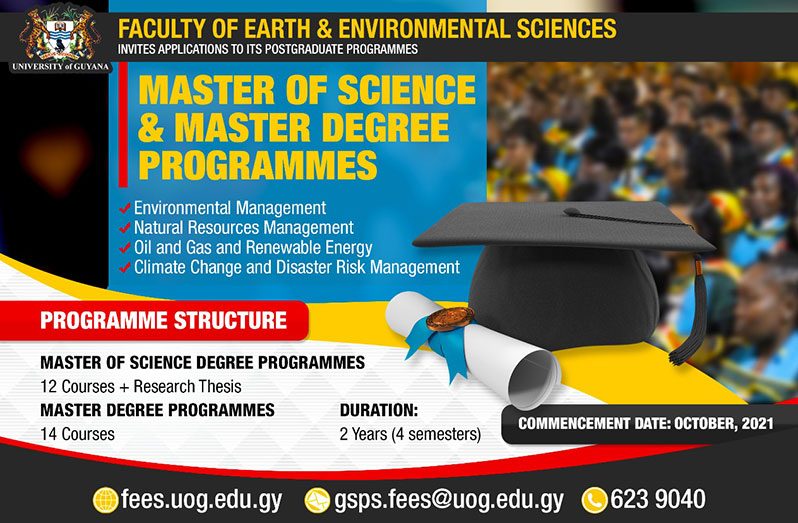THE Department of Environmental Studies of the University of Guyana’s (UG)’s Faculty of Earth and Environmental Sciences (FEES) will officially launch four specialised Master of Science and Master’s Degree programmes in October 2021.
According to a statement released by the university, the courses will be taught by leading academics and experts from reputable local, regional, and international universities, agencies and organisations, as well as the private sector.
This new suite of programmes adds to the several other new programmes being offered by the university in the new academic year. Those and other programmes were introduced as part of a response to the growing need for quality affordable and relevant programmes in Guyana and the Caribbean.
The four specialised programmes on offer for the Master of Science and Master’s Degrees are: Environmental Management, Natural Resources Management, Oil-and-Gas and Renewable Energy, and Climate Change and Disaster Risk Management.
The Environmental Management (EM) programme seeks to promote the use of environmental safeguards in organisations, and will provide skills and knowledge related to the processes or activities that cause environmental degradation and pollution, and the approaches to effect sustainable change.
It is designed to equip the aspiring Environmental Manager with a complement of technical skills and expertise, which will contribute to the formulation of efficient, dynamic, safe and sustainable industries.
The programme will provide exposure to analytical skills and research, current environmental management systems, ‘green’ technology approaches, sustainable energy pathways, pollution control mechanisms, and environmental and occupational health.
The Natural Resources Management (NRM) programme is designed to promote the sustainable management of natural resources within Guyana and territories which share a similar geophysical and tropical landscape.
While building competencies in the conduct of environmental assessments, and the use of geospatial technology, the programme will also provide exposure to core courses which will serve to enhance research and analytical skills.
The aspiring Natural Resources Manager taking this course can garner specific skills needed for the management of ecosystems, parks, protected areas and water, forest, land and coastal resources.
The Oil and Gas and Renewable Energy (OGRE) programme emerged with the need to furnish Guyana’s oil-and-gas and renewable energy sector with trained personnel possessing industry-specific skills to promote the sustainable utilisation of energy resources. It offers a unique blend of courses that expose students to the operations of the dynamic energy sector, while providing tools for the development of research and analytical skills.
This programme focuses on the environmental consequences of energy use, the minimisation of the impacts of the sector, and opportunities for use of renewable energy, and includes courses such as: Environmental Management of the Offshore Environment; Energy Economics; Renewable Energy Simulation; and Health, Safety and Environmental Management for the Oil and Gas Industry.
The Climate Change and Disaster Risk Management (CCDRM) programme is a specialised one, designed to address Climate Change and Disaster Risk Management issues in Guyana and the wider Caribbean.
The programme is multi-disciplinary in structure, merging the streams of Climate Change and Disaster Risk Management. Students will be able to make clear linkages between the impacts of climate change, and the implementation of disaster risk management approaches.
It consists of core courses such as: An introduction to climate change science and modelling; climate change policy and negotiations; climate change impacts; mitigation and adaptation; community-based disaster risk management, and disaster risk management in the caribbean.
ENHANCING EMPLOYABILITY
The programmes will be multidisciplinary and interdisciplinary, and serve to enhance the employability of students by incorporating new-age skills for future work opportunities.
They aim to build capacity among national and regional professionals by equipping them with working knowledge, skills and technical expertise in a range of areas such as ecosystem services and valuation; national, regional and international environmental law and policy; environmental management and monitoring tools and techniques; environmental economics and policy; build pollution control and waste management approaches; management of natural resources; climate change and disaster mitigation, and environmental policy formulation and appraisal.
Apart from building academic capacity, the programmes will also offer tools which will aid in building professional competencies in the areas of data analysis with the use of statistical software, communication through written reports and oral and visual presentations.
Other important tools are scientific analysis and writing, geographic information system (GIS) mapping and software application, life cycle analysis, environmental management systems, and environmental impact assessment.
Qualifications gleaned from the programmes are expected to prepare graduates for managerial and technical appointments within the specified fields.
Furthermore, the careful selection of elective courses, particularly within the Environmental Management and Natural Resources Management programmes, can allow for specialisation.
Potential career opportunities that could be pursued upon completion of the programmes include: Climate Change Analysts, Disaster Risk Management (DRM) Coordinators, Environmental Monitoring Technicians, Environmental Policy Analysts, Health, Safety and Environment (HSE) Managers, Pollution Analysts and Quality Control Analysts.
The respective Master of Science and Master Degree programmes consist of a combination of core and elective courses, which are to be completed over two years (4 semesters).
The Environmental Management and Natural Resources Management programmes each have eight core courses and four electives, while the Oil and Gas and Renewable Energy and the
Climate Change and Disaster Risk Management programmes each consists of 11 core courses and one elective course.
Students enrolled in the Master of Science programmes will be required to complete a research project, while those in the Master’s Degree programmes will be required to complete the scientific demonstrations in research and environmental leadership courses.
Courses will be delivered using hybrid approaches constituting of “in class sessions” and “online platforms” such as Zoom and Moodle. Delivery will be conducted through the employment of various teaching strategies, including lectures, seminars, tutorials, labs, and fieldwork.
Anyone desirous of viewing a full list of UG’s degree offerings can visit: https://www.turkeyenonline.uog.edu.gy/srms/student/prospective/about_applying/offeredprogs.php




.png)









